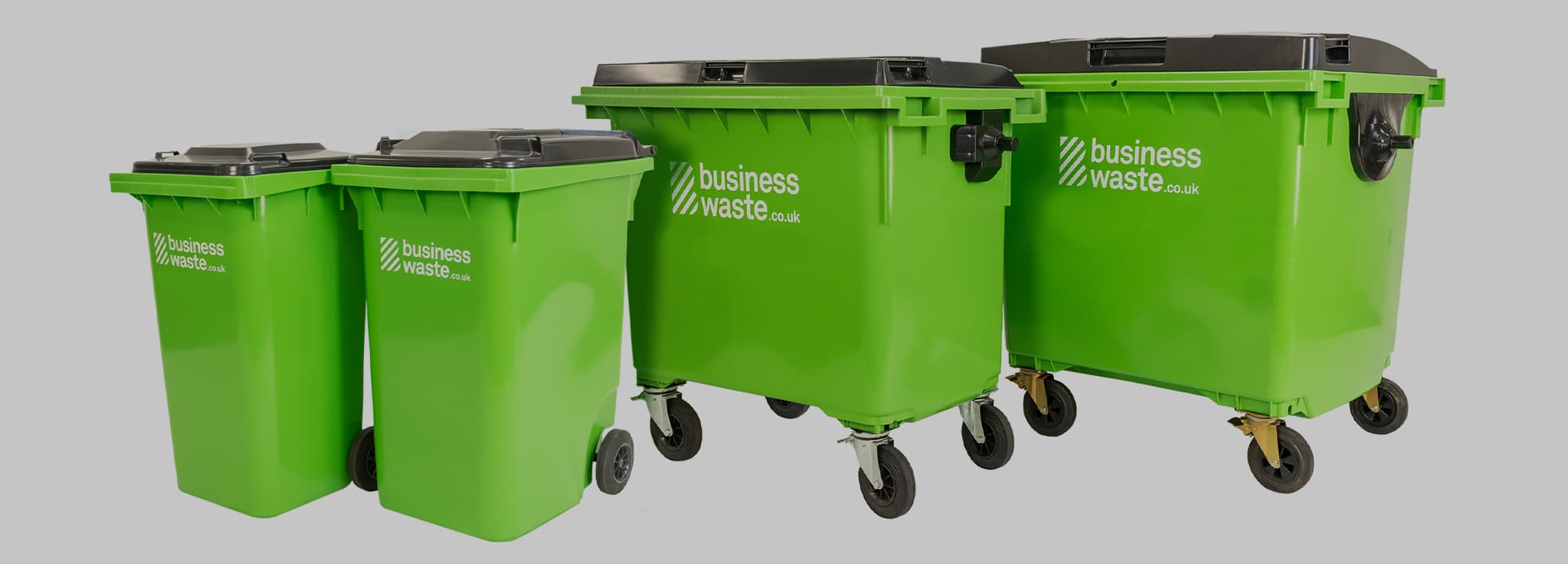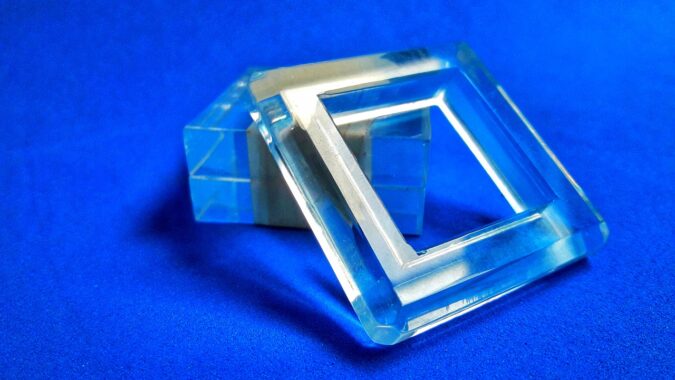
Acrylic Recycling
Acrylic is a common hard plastic that’s often used as an alternative to glass in windows, eyeglasses, and aquariums. It goes by many names, including polymethyl methacrylate (PMMA) and brand names such as Plexiglas and Perspex. Recycling acrylic is possible and should be done to protect the environment.
Businesses across many industries create a wide range of waste acrylic products that require recycling at the end of their life. Recycling acrylic is more challenging than other types of plastic due to its properties. The difficulties of recycling acrylic mean not all recycling centres accept it or have the facilities to recycle acrylic.
At Business Waste we offer solutions for acrylic recycling anywhere in the UK. Learn all about recycling acrylic and get a free quote for plastic waste collection today – call 0800 211 8390 or contact us online.

Get a free quote
Get a fast FREE quote for recycling acrylic
- Free quote within 1 hr
- Any type of PMMA plastic
- FREE bins and delivery
- We cover all of the UK
What is PMMA plastic?
Polymethyl methacrylate (PMMA) is a rigid and transparent thermoplastic commonly referred to as acrylic. It’s often used as an alternative to glass due to its shatterproof properties with durability ten times greater than glass. Acrylic plastic also weighs around 50% less than glass of an equal thickness and has a transparency rate of 93%.
Further characteristics of PMMA plastic include its strong glare reflection, scratch resistance, solar reflectivity, and anti-fogging capabilities. Acrylic will retain its properties when heated or cooled as it’s a thermoplastic. PMMA plastic falls under recycling code 7 as it’s a type of plastic that isn’t as easy to recycle as some others.
Common uses of acrylic plastic include in:
- Windows
- Glasses lenses
- Signs
- Aquariums
- Hockey rinks
- LCD screens
- Security barriers
- Medical devices
Is acrylic recyclable?
Acrylic is fully recyclable. However, the materials and process used to create acrylic make it difficult to recycle, so some recycling centres and companies don’t accept it. Recycling acrylic is possible at specialist recycling centres though and should be done to avoid it ending up in landfill.
You can store acrylic with other plastic waste on your premises in a plastic waste bin, but it will be sorted and recycled separately. The recycling process for acrylic differs from other types of plastic as there’s no need to add new materials. It also avoids the material degrading when recycled.
Recycling acrylic at home can be tricky. Households should check whether the local authority or council accepts code 7 plastic waste (including acrylic) in their domestic recycling bins. If they don’t then you can see if your nearby household waste recycling centre (HWRC) takes acrylic waste for recycling – or contact us at Business Waste for help.

How is acrylic recycled?
PMMA is a polymer, so to recycle acrylic it goes through a process of depolymerisation. First, the plastic waste is checked, sorted, and separated to ensure only acrylic is recycled together. It’s cleaned to remove any contaminants and ensure the highest quality output. Then acrylic is recycled through depolymerisation.
The process of depolymerisation involves three key steps:
- Acrylic is heated through the process of pyrolysis. During this process, the waste acrylic undergoes thermal degradation, which creates smaller volatile molecules.
- Molten lead is added to the acrylic. This separates methyl methacrylate from the catalyst, resulting in a molten MMA of around 98% purity.
- The acrylic resin this creates is cast or extruded back into flat sheets or shapes. These new recycled acrylic sheets are sent to manufacturers for use in creating fresh products.
Why is recycling
acrylic important?
Recycling acrylic is important to reduce the amount of plastic waste that ends up in landfill or incinerators. Acrylic isn’t biodegradable, so it won’t break down over time. Instead, if acrylic goes to landfill it can remain there for hundreds of years, adding to pollution and carbon emission levels.
Incinerating acrylic releases greenhouse gases so should be avoided. Acrylic recycling also reduces the energy and resources required to create new acrylic from scratch. The extraction and processing of oil to form acrylic can add to pollution, which is avoided when creating new products from recycled acrylic.
Businesses can save money on landfill tax by recycling acrylic rather than disposing of it with general waste or another method that leads to landfill. As acrylic is 100% recyclable it’s worth finding a solution to recycle all waste PMMA your business produces to save money, protect the environment, and boost your green reputation.

How to dispose
of acrylic
Businesses must book commercial waste collection of any waste produced, including waste plastic and acrylic. PMMA can be stored with other types of plastic waste on your premises before it’s removed and recycled, as it’ll be sorted and separated at the recycling centre before processing. To dispose of acrylic properly follow these steps:
- Request a free no obligation quote for waste plastic collection. Let us know the number and size of plastic bins you need, how often you want them collected, and where you’re based in the UK for a tailored quote.
- Get free bins delivered to your business anywhere in the UK – only pay for collection. We’ll deliver the bins you request to fill with waste acrylic and other plastic types within any weight limits and max fill lines.
- Move your bins to the agreed pickup point ahead of the collection time. A team of licensed waste carriers will remove your plastic waste bins and replace them if you’ve arranged regular collections.
- Your plastic waste will be taken to a local waste management centre for checking, sorting, and separating. The acrylic waste will be removed and sent to a specialist recycling centre for depolymerisation and recycling.
- Receive a free duty of care certificate for every load of plastic waste removed from your site. This confirms the safe, legal, and responsible removal and disposal of your plastic and acrylic waste.
Disposing of acrylic at home can be done in some domestic recycling bins. Check if code 7 plastic is accepted in your household recycling bins (including acrylic), as not all authorities and councils will recycle it. If not, check if you can recycle acrylic at your nearest HWRC. Alternatively, contact Business Waste to arrange acrylic waste collection.
Who needs to
recycle acrylic?
Every organisation that uses acrylic sheets or products should send them for recycling when they reach the end of their life. When you recycle acrylic it saves your business money on commercial waste disposal costs, upholds your duty of care responsibilities, and benefits the environment. Some of the main industries that should recycle acrylic include:
Arrange PMMA plastic
waste collection
Book plastic waste collection anywhere in the UK including the removal of your acrylic and PMMA waste. Get a free no obligation quote based on the number and size of bins you need, how often you want them collected, and your location. Daily, weekly, and fortnightly collections are available.
We deliver free bins to store your PMMA plastic waste – you only cover the collection costs. Bins are available in a range of sizes from 120 to 1100 litre wheelie bins. You’ll receive a free duty of care certificate with each load removed too. Call 0800 211 8390 or contact us online for your free quote today.
Acrylic recycling FAQs
-
Is acrylic biodegradable?
Acrylic plastic is not biodegradable. Bacteria and microorganisms cannot break down acrylic and it can take hundreds of years for it to eventually decompose through natural processes. Acrylic is commonly used due to its resistance to degradation. Therefore, waste acrylic should be recycled and disposed of responsibly as it won’t biodegrade in landfill.
-
What plastic code is acrylic?
Acrylic and PMMA waste are classed under plastic recycling code 7. This is because it’s harder to recycle than the other six types of plastic. It can be stored with other waste plastic but will be recycled separately due to its properties and the depolymerisation process. Other plastics that fall under code 7 include polycarbonate, ABS, and fibreglass.
-
Is acrylic plastic toxic?
Acrylic plastic is not toxic and has similar properties to glass. It doesn’t release chemicals at normal temperatures and is safe for the storage of food and drink. However, toxic fume may be released during the production of acrylic and if it’s disposed of improperly it may release chemicals into the environment, such as in landfill.
-
How is acrylic made?
Acrylic is made through polymerisation. The monomer methyl methacrylate is added to a catalyst that causes a reaction and joins carbon atoms together in a chain. This stabilises the final acrylic. The acrylic is either extruded or cast.
Extrusion forces acrylic through a nozzle to form rods and more shapes. Cast acrylic involves pouring the acrylic resin into a mould. Often this is between two sheets of glass. They’re heated and pressurised to remove any bubbles, then the edges are sanded and buffed to form sheets of acrylic.
-
Can you melt acrylic plastic?
Acrylic plastic has a melting temperature of 160 °C. Melting or incinerating acrylic should be avoided as it can release harmful emissions into the atmosphere. Acrylic has high durability and is resistant to degradation, so it’s safe to use at normal temperatures and will retain its properties when heated.
Get a fast and free quote
Get a fast FREE quote for plastic waste collection
- Free quote within 1 hr
- Any type of waste plastic
- FREE bins and delivery
- We cover all of the UK